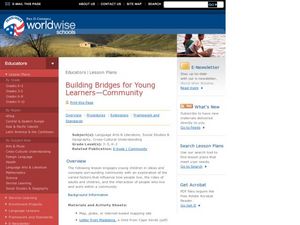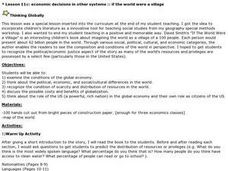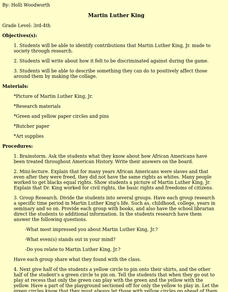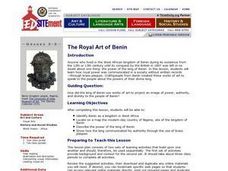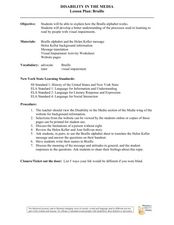Curated OER
Building Bridges for Young Learners -- Community
Learners compare and contrast communities.They explore factors that influence how people live, the roles of adults and children, and the interaction of people who live and work within a community. The lesson focuses on the country of...
The New York Times
Making Do: Learning and Growing Through Adversity
What is it that makes people keep going when they face challenges in life? Ask your class to consider this question in relation to their own experiences and as they read material from The New York Times. Using personal experiences...
University of Texas
Scarcity
How can having too little of something impact your life? Scholars investigate the concept of scarcity in their own lives and in the overall picture of the economy. Brainstorming activities as well as student-parent work bring to light...
Shakespeare Globe Trust
Fact Sheet: Audiences
In Shakespeare's time, people could attend a play at the local theatre for as little as one penny. Using an informative handout, scholars learn about the typical London audience member during the 1600s. Readers explore how theatre...
Curated OER
If the World Were a Village...
Your class members explore concept that the world is a large place, examine how statistics can be used to help in understanding the world and its people, and create illustrations or graphs of statistics found in the award-winning...
Curated OER
Aquatic Roots
Young scientist use reference materials to research various local aquatic plants and or animals to find out whether they are natives or exotics. They investigate their impacts on people, other animals and the environment. Learners...
Curated OER
Social Class Stereotypes
Encourage your students to think about how and why people and categorized in terms of social class. They decide what "class" they belong to, and then brainstorm about the indicators that society uses to define class and to categorize...
Curated OER
"Cures" Chart
Students chart the "cures" for people with disabilities. For this disabilities lesson, students compare and contrast the care and treatment of people with disabilities in the past and present. Students write accurate summaries presented...
National Endowment for the Humanities
Revolution '67, Lesson 1: Protest: Why and How
To some people, protesting is as American as apple pie, but the factors that lead to protests can be as confusing to veteran activists as to today's youth. Revolution '67 explores the riots in Newark, New Jersey as a case study. ...
Voice of America
Henry Ford, 1863-1947: He Revolutionized the Auto Industry
How did Henry Ford change the world? One word: automobile. After reading a two-page passage about Henry Ford's contributions to society with the invention of the automobile, readers respond to a series of 10 reading comprehension...
Curated OER
Martin Luther King
Identify contributions that Martin Luther King, Jr. made to society through assigning a research project! Third and fourth graders write about how it felt to be discriminated against during the game. They describe something they can do...
Curated OER
Causes of America's Great Depression
Students identify principal causes of the Great Depression. They analyze causes including a decline in worldwide trade, the stock market crash, and bank failures and explain the legacy of the Depression in American society.
Curated OER
Paper Clip Game for Learning the Value of Rules
Young scholars explore the components of good rules and their importance in society. Consistency and fair application for the maintenance of order is emphasized as paper clips and the rules of a game are manipulated.
Institute of Electrical and Electronics Engineers
Adaptive Device Design
After reading about how engineering has made adaptive devices possible for people with disabilities, pupils work in groups to discuss different devices to determine whether or not they are adaptive. They also disassemble a pair of...
Curated OER
What Makes the Writer Write
Your 11th and 12th graders are ready to critique society! Channel that inclination by studying a novel that offers social criticism of other eras (book recommendations included). This resource presents a well-thought-out overview of such...
Curated OER
Benjamin Franklin: Goods and Services in Colonial America
Fifth graders examine the impact of Benjamin Franklin's ideas on the goods and services available in Colonial America as well as analyze the importance of Franklin to modern society. While listening to "How Ben Franklin Stole the...
Missouri Department of Elementary
So Much to Do, So Little Time: How Do I Tie All of the Loose Ends Together?
How do people manage to get everything done when there are so few hours in a day? Scholars explore the question as they participate in small group discussions about time management. They construct a daily schedule and complete a...
Missouri Department of Elementary
My Problem…Your Problem…Our Problem
Encourage sixth graders to take responsibility for their actions and become a problem solver. Pupils discuss new problems faced in sixth grade then identify ones that involve other people. A worksheet guides their practice in conflict...
Curated OER
The Royal Art of Benin
Students investigate how the king of Benin used brass plaques to project an image of power to the people of Benin. They locate Benin on a map, explore various websites, and create a paper wall plaque that conveys symbols of power.
Institute of Electrical and Electronics Engineers
Biomimicry in Engineering
Take a look with your class at how nature supplies inspiration to engineers. In cooperative groups, youngsters research biomimicry and then develop a system that would help support people living on the moon. Each team also considers...
Curated OER
Disability in the Media Lesson Plan: Braille
Students determine the workings of the Braille alphabet and how people with visual impairments learn how to use it. In this Braille lesson, students study the associated vocabulary, read about Helen Keller, and complete associated...
K12 Reader
Responsibilities of Citizenship
Your pupils are all citizens of your classroom. Provide some more instruction on how people can be citizens with the reading passage included here. After reading, learners answer the five related questions.
University of the Desert
Do Journalists Shape or Report the News?
Analyze the presence of negative stereotypes and biased reporting in news media, and how this affects one's understanding of other cultures. Learners read newspaper excerpts and quotes from famous personalities to discuss...
EduGAINs
Migration—Push and Pull Factors
What causes people to move from one place, one city, or one country to another? Using the provided migration questionnaire, learners interview family members about the factors that cause them to be pushed from an area or pulled to...
Other popular searches
- People and Society Geography
- People and Society Europe
- People and Society Primary
- People and Society China
- People and Society n.c.
- Austria's People and Society
- People and Society Australia
- People and Society Nc


